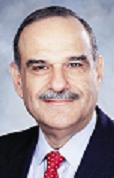New Orleans Installing Surveillance Cameras...
From the AP by way of the Las Vegas Sun:
The man marched down the street in daylight, armed with a paintball rifle that had been converted to shoot with lethal force. He then blasted a newly installed camera in hopes of freeing the drug-ridden neighborhood from police surveillance. But the shooter's image was saved on the camera's hard drive.
"All it did was get him arrested," chuckled New Orleans' chief technology officer, Greg Meffert. "The camera immediately notified the police and tracked him until he was caught."
And when they got him, they found he was wanted on a murder warrant. The arrest was the first success story from a sophisticated new crime-fighting system of cameras that New Orleans is installing citywide.
The bulletproof cameras can monitor an eight-block area, communicate with the authorities and provide evidence in court. Police hope the system will catch crooks in the act and serve as a crime deterrent in a city long plagued by drugs and murders.
Civil libertarians are calling it Big Brother in the Big Easy, expressing concern about an invasion of privacy and the potential for misuse by police. The American Civil Liberties Union believes there are better ways to fight crime.
"They would be much better off to use the money to hire more officers and train them to interact with the public," said Joe Cook, Louisiana's ACLU director.
City officials insist there are tight controls, and they are encouraged that dozens of community groups have signed up to pay $5,000 apiece to get cameras installed on their street corners.
"Maybe the ACLU doesn't have people dealing drugs in their neighborhoods 24 hours a day," said Lisa Martin, who has a camera in her neighborhood. "We asked for a camera, we wanted it. We don't want to be afraid to go outside."
A few cities, including Chicago and Los Angeles, have started similar programs. But some cities, such as Oakland, Calif., have scrapped plans to use cameras after finding they were not effective.
So far, about 240 of the proposed 1,000 cameras are in operation. Mounted at the height of a street light, the cameras conduct 360-degree "virtual patrols" continuously. Their high-resolution lenses can produce recognizable pictures in all light levels and can read a license plate up to 400 feet away.
Police see them as one answer to the growing problem of witnesses being too intimidated to testify.
The man marched down the street in daylight, armed with a paintball rifle that had been converted to shoot with lethal force. He then blasted a newly installed camera in hopes of freeing the drug-ridden neighborhood from police surveillance. But the shooter's image was saved on the camera's hard drive.
"All it did was get him arrested," chuckled New Orleans' chief technology officer, Greg Meffert. "The camera immediately notified the police and tracked him until he was caught."
And when they got him, they found he was wanted on a murder warrant. The arrest was the first success story from a sophisticated new crime-fighting system of cameras that New Orleans is installing citywide.
The bulletproof cameras can monitor an eight-block area, communicate with the authorities and provide evidence in court. Police hope the system will catch crooks in the act and serve as a crime deterrent in a city long plagued by drugs and murders.
Civil libertarians are calling it Big Brother in the Big Easy, expressing concern about an invasion of privacy and the potential for misuse by police. The American Civil Liberties Union believes there are better ways to fight crime.
"They would be much better off to use the money to hire more officers and train them to interact with the public," said Joe Cook, Louisiana's ACLU director.
City officials insist there are tight controls, and they are encouraged that dozens of community groups have signed up to pay $5,000 apiece to get cameras installed on their street corners.
"Maybe the ACLU doesn't have people dealing drugs in their neighborhoods 24 hours a day," said Lisa Martin, who has a camera in her neighborhood. "We asked for a camera, we wanted it. We don't want to be afraid to go outside."
A few cities, including Chicago and Los Angeles, have started similar programs. But some cities, such as Oakland, Calif., have scrapped plans to use cameras after finding they were not effective.
So far, about 240 of the proposed 1,000 cameras are in operation. Mounted at the height of a street light, the cameras conduct 360-degree "virtual patrols" continuously. Their high-resolution lenses can produce recognizable pictures in all light levels and can read a license plate up to 400 feet away.
Police see them as one answer to the growing problem of witnesses being too intimidated to testify.





0 Comments:
Post a Comment
<< Home